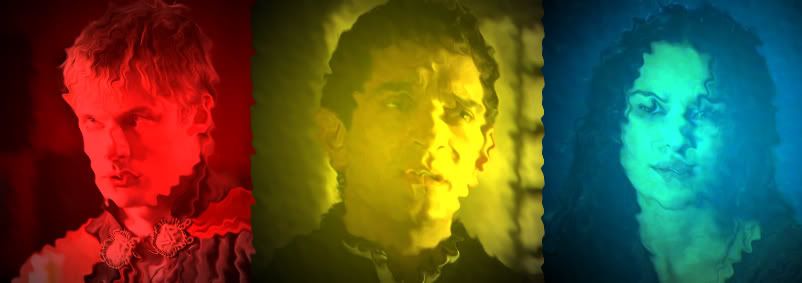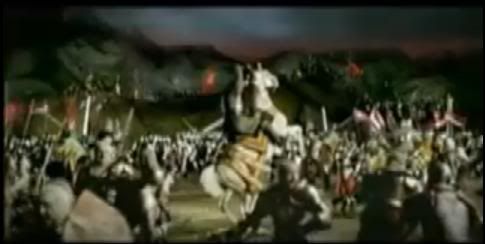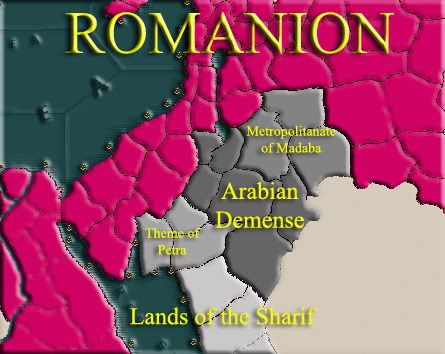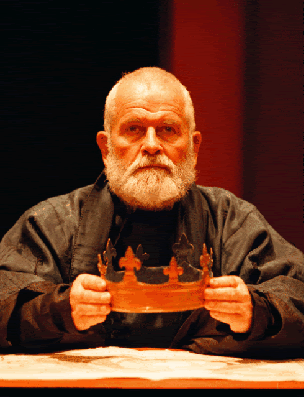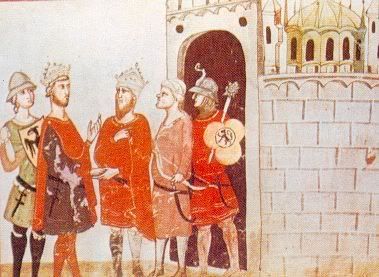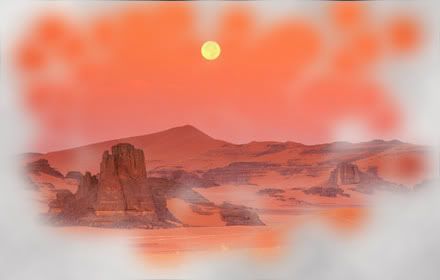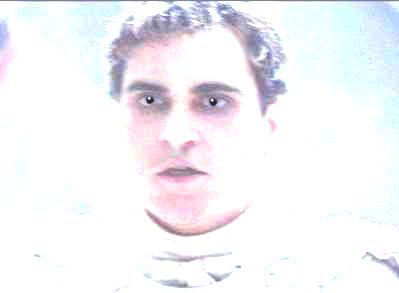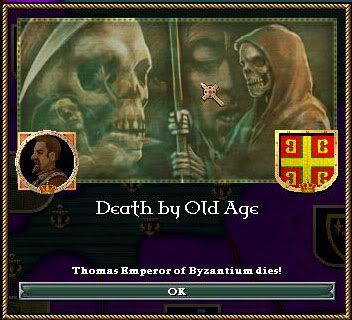”Praise be unto God, who hath delivered the city of the heathen unto our hands!” – Patriarch Simon, on hearing of Mecca’s fall.
“We have been cast out? I ask the same question as Job, why, oh God, hast thou forsaken us!” – ibn al-Nafis, on hearing of Mecca’s fall.
End of an Era
April 9th, 1238
Gabriel Komnenos, now Gabriel I, Emperor of the Romans, resisted the urge to wipe the sweat off his brow. If this had been any other occasion, he wouldn’t have been standing in the hot Arabian sun in gilt armor completely with parade helm and cape. But for today’s occasion—the surrender of Mecca—nothing except the finest attire would have done for the Emperor of the Romans, even if his status as Emperor was known only to himself and the army gathered behind him.
It’d taken three weeks to come to this point, but the final turning point, Gabriel mused, hadn’t come from any eloquence on his part. The defenders of Mecca had outright refused to surrender for months, despite a lack of food and constant assaults. Only two weeks before, barely a week after Emperor Thomas had his disastrous fall, scouts had galloped into the Roman camp, bearing news that a relief army was moving on Mecca—a force from some realm named Yemen, 12,000 strong. It hadn’t really been much of a match—Gabriel left 4,000 behind to watch the beleaguered city, while taking 25,000 south. Whoever the Yemeni leader had been, he’d been foolish. If Gabriel had been in his shoes, he would’ve used the desert to launch raids, but this ‘Sultan’ or whatnot had decided to bring a large force of levy foot, men that slowed his army down, and tied it to the shore. As a result, Gabriel was able to accurately guess where they would march, and set up an ambush with his larger force accordingly.
The defeat of the Yemeni army outside of Jeddah on March 1st, 1238 did not end the Yemeni threat to the nascent Roman hold on Arabia. Throughout the 13th and 14th centuries, periodic Yemeni raids or invasions would threaten the Roman hold on the region.
That had finally broken the back of Meccan resistance. What words and promises couldn’t accomplish, the paraded head of the Yemeni Sultan and his Grand Vizier hoisted on pikes did. Yes, thousands of the Yemenis fled to the desert, and Gabriel had no doubt they would be raiding across the area for a long time to come—and that’s why he’d leave almost 10,000 men behind. However, their immediate goal—the capture of Mecca, was at hand.
Gabriel rocked on his heels in impatience as the gates to the city finally creaked open, and a tattered and worn parade of officials and locals came out. The new Emperor of the Romans glanced over his shoulder, then pointed. Several pairs of enlisted men, each carrying a pole bearing a large bucket of water, walked towards the oncoming bedraggled mass. The men coming from the city kept their dignity as children ran forward, screaming for water in Arabic, but Gabriel could see the thirst in their eyes. The ceremony would be delayed, and he’d have to stand out in the hot sun in his blasted Roman armor and cape even longer, but the message this sent to Mecca, and, Gabriel hoped, the wider Muslim world, was worth it.
We may be your overlords, but we are generous, and we seek peace.
The word ‘generous’ made Gabriel chuckle slightly. The terms offer to Mecca were
more than generous—some of the bishops in the Roman camp doubtlessly called them sinful, blasphemous, foolish, or some combination of the three.
Firstly, Mecca was to remain inviolate—it was the entire reason Gabriel even now rocked on his heels in the hot sun, the Roman army drawn up in perfect ranks in parade kit behind him. True, he’d allowed some of the servants in the camp to mill amongst the Roman soldiers with water to keep them cool, but he needed to look the part of the Emperor, not a mortal in the Meccan sun. If Mecca had been any other city, the Emperor and the army would have marched inside, and considering its stubbornness, Gabriel would have allowed the men three day’s liberty. Instead, no Christian was to set foot inside the city, ever, under pain of punishment from the state.
Secondly, the city would be governed by a Muslim. Of course, this new
Sharif was to be appointed by the state and in effect be just another bureaucrat in the Roman government, but his faith would have immense
symbolic value. The new
Sharif would serve at the pleasure of the Emperor, and in effect act as governor of the city and the immediate area in the name of the Empire—he would collect taxes, distribute gifts, and dispense justice as any other governor, in addition to his religious duties as ‘Guardian of the Two Cities.’
Thirdly, Gabriel swore in the name of the Empire that the Romans would not interfere with the
hajj, a fear the new Emperor had heard repeated from Muslims in Africa, the Near East, and Persia. Other than his requirement that Mecca remain standing, this was the section of the treaty Gabriel had the most… complaints…over. The Bishop of Madaba in effect complained that Gabriel was supporting heathenism through not suppressing this ‘unholy pilgrimage,’ but the Emperor ignored him. Interfering with the
hajj would have been tantamount to declaring war on every Muslim in the Empire, a fight, Gabriel knew, the Empire didn’t need and might not survive.
Finally, the Emperor promised that the lands of Jeddah, Mecca, and Medina would be administered separately from the Empire. The new entity would be at the least autonomous, with the goal of giving local flexibility in dealing with religious matters, while granting the Emperor (back in Konstantinopolis, Gabriel assumed), ‘plausible deniability.’ If the local ‘Lord of Arabia,’ (Gabriel had yet to settle on a title) decided on a course that upset the Patriarchates, the Emperor could publicly condemn the action saving face with his Christian heartland, while privately sending funds or other support.
The new land of Arabia was to be a Roman protectorate-independent in name, dependent on Konstantinopolis in practice. Initially there was confusion on what to call the new Lord of Arabia—Despotes was a title used for lords WITHIN the Empire, and a dangerous precedence would be set for the likes of Bardas if the title was used for a nominally independent lord, however Exarch had fallen out of vogue since Naijar’s abortive revolution. At first, Georgios Donauri would have to be called—Lord. The new land of Arabia itself was split into four parts—the theme of Outrejourdain, now the desmense of the Donauri family, the theme of Petra, formed on the lines of all regular themes, the lands of the Metropolitan of Madaba, who would be one of the most intransigent of Arabian nobles for the Donauris, and finally the lands of the Sharif, now under Donauri control and compelled to obey by Roman arms.
Gabriel’s eyes settled on the man he’d chosen for this task, and he gave a slight sigh. Georgios Donauri didn’t look happy at all, and in a way, Gabriel didn’t blame the elderly
strategos. Despite Georgios’ age—the man was only 50—the Hejazi campaign was likely to have been his last. Gabriel’s father had already arranged for his childhood friend to assume the title Prince of Outrejourdain, head of the
theme of the same, before the campaign even started. True, Donauri was receiving an immense promotion to royal rank, but with that promotion came immense responsibility, precisely at the time when the old warhorse didn’t
want any. Whoever was Lord of Arabia would have a hornet’s nest of problems—not just Mecca, Medina and the pilgrims therein, but the inevitable influx of Greek and Christians into the area, and the doubtless turmoil
that would bring. And while the Yemenis had been thrashed, there was little doubt they’d come back—it would be ever so easy for their leaders to making hay claiming they were attempting to recue Mecca from infidels. It was a hell of a way to reward a man on his retirement, but Gabriel saw little choice.
Georgios Donauri had been the son of the old
comes of Madaba. Raised on the desert fringes of the Empire, he’d spent his early years dealing with Muslims at his father side, before Madaba was handed to the Church and the Donauris recalled to Konstantinopolis where the young Georgios became friends with the young Emperor. His family’s name was known and respected to the Muslims of the Levant, and Gabriel knew Donauri to be a fair and just man, if slightly a-religious—a perfect combination, in Gabriel’s mind, for someone to head this new entity.
Georgios Donauri was very reluctant to take his new, powerful role in Arabia. It exposed his family to danger, and was far from the creature comforts he expected on retirement.
Finally the small bevy of men, the lords and dignitaries of the town, reached the ground in front of the Emperor. As the ceremony called for, they knelt on one knee, instead of prostrating themselves—all except for one. Is’mail abu-Mahjid, as titular
Sharif after the desposition of abu-Saad, did not knee, but instead walked forward the final few yards till he was face to face with the Emperor of the Romans.
The Muslim leader wasn’t as impressive as Gabriel thought he’d be—from the descriptions of Is’mail abu-Mahjid in battle, the
Autokrator had expected a giant of a man, fierce of gaze and merciless in war. Instead, what stood before him was a man made rail-thin from starvation, skin haggard and frame so gaunt that his robes seemed to be eating him alive. The only thing that marked the man as a leader, to Gabriel’s sight, was his eyes—where the rest of his body was weak, worn, abu-Mahjid’s eyes were deep brown, burning with fiery passion and deep sadness at once.
“Greetings, Your Majesty,” the man said in halting Greek, as proscribed by the agreed formula of the ceremony. He bowed, but not the full bow the ceremony had called for—only a curt nodding of his head. Gabriel heard the
strategoi take in their breath, and saw abu-Mahjid’s eyes as he looked up—defiance.
“Greetings, Lord abu-Mahjid,” Gabriel replied in curt Arabic, refusing the nod he had been proscribed to give. If the Arab wanted to not bow out of pride, the Emperor could not nod out of the same.
“I bring to you my sword,
Jabreel ibn Thu’mas,” abu Mahjid raised his arm, holding forth a sheathed scimitar, steel hilt glinting brightly in the sunlight. “I and the city of Mecca yield before your armies, Emperor of the Romans. I ask for mercy to be shown on the city, and its people, in the name of Allah the Righteous, who protects us.”
The surrender of Mecca, as depicted in a Frankish account of the event from 1275
Gabriel reached out, hands clasping the sword. The Emperor pulled slightly, but found abu-Mahjid’s grip solid as iron. Gabriel smiled slightly. “You may let go of the sword now, My Lord,” the new Emperor whispered quietly.
“Not until you swear to me my faith, and my people are safe,” abu-Mahjid whispered grimly.
“You have seen the terms…”
“I care not about papers!” abu-Mahjid hissed, steel in his tired, worn voice. “I want your oath, as a man, standing on holy ground, that my city, my people, and my
faith will be safe!”
Gabriel looked the man up and down and was once again amazed by the strength still present in those frail limbs. His gaze returned to abu-Mahjid’s eyes—they blazed with courage, defiance. Gabriel’s own blue orbs met them levelly, quietly.
“I swear, in the name of my grandfather the
Megaloprepis and his grandfather the
Megas,” Gabriel whispered, “that I, Gabriel Komnenos,
Autokrator ton Romanion, will do everything within my power to safe guard this city, its inhabitants, and your faith.”
Gabriel wasn’t sure what it was that changed—he just
knew. The Meccan leader’s whole body seemed to relax slightly, as if a great burden had been lifted from his shoulders. The Roman emperor felt his counterpart’s grip loosen, and slowly, Gabriel pulled the sword away from the Meccan. For a second, silence hung over the plains of Mecca, before a thunderous cheer roared from the assembled Roman army.
Mecca had fallen.
The Hejaz was theirs.
The Empeor smiled, holding the sheathed blade aloft and turning to his men. For several minutes he let them enjoy their victory—it was as much their blood and sweat that had won the day as the plans of Gabriel or his father—but after several minutes, he raised his hand open. The noise of thousands of voices dropped to quiet as the Emperor drew abu-Mahjid’s blade from its sheath, holding it skyward.
“All who are here, bear witness!” Gabriel called, the scimitar in his hand shining in the rays of the morning sun. “I, Gabriel Komnenos, Emperor of the Romans, do hereby proclaim that this man,” Gabriel slowly turned, showing his face to Muslim and Roman alike, “Is’mail abu-Mahjid, is now the
Sharif of Mecca by Imperial decree! He will govern the city, and protect its landmarks and peoples, by our will!” Gabriel turned back, to see a rather stunned new
Sharif looking at him in confusion, and smiled.
A good enemy is one you knew. Appointing him Imperial
Sharif helped Gabriel immensely—it could put abu-Mahjid in the debt of the Empire, but at the very least it
removed him from being a credible organizer of any resistance to the Empire. As they said, the devil you know…
Gabriel’s very proud of himself…
“
Sharif,” the Emperor resheathed the scimitar, and handed it back to its owner, “I think you and Lord Donauri will be getting to know each other very well. Perhaps, after things have settled slightly, you would like to join him and I for dinner in the imperial tent?”
==========*==========
April 10th, 1238
“A bloody lord!” Georgios Donauri laughed the next morning. The eastern horizon was only just turning indigo, as a budding sunrise promised to push aside the darkness of night.
“You’ll be a bloody failure, like everything you’ve touched,” his companion whispered wryly, before a series of wet, dark coughs took his voice from him. Donauri turned to the propped up form Emperor Thomas II and laughed sadly. The Emperor had insisted the night before that his cot be taken to the top of the same mountain where Muhammad was visited by the angel Gabriel so he could see the sunrise. Georgios had decided, on a whim more than anything, to go up with his friend.
Since the chaos of the previous day and the city’s surrender, there’d been a slew of things to finish, but Donauri decided he needed a break. Picking a group of
logothetes for Arabia would be a process that took months, as would properly pegging abu-Mahjid. Georgios knew Gabriel was a devious young man, but he still wanted to be sure that the new
Sharif would work with him at least passably well.
“Probably. Leave it to your son to shove something this grave on the plate of an old man that wants peace,” Georgios added, watching Thomas smile. The old Emperor hadn’t fully realized his paralysis until many hours after his accident. Donauri shook back the memories of Thomas’ initial horror, in favor of what came surprisingly soon afterwards—his acceptance. Thomas had even gone as far to say his son’s impromptu coronation was perhaps the most responsible thing to do—many an emperor would have resented it, no matter its necessity.
Despite that, Donauri felt a slight tinge of anger at the young man—Gabriel scarcely visited his dying father, scarcely said anything, good or bad, to the old man. Thomas had seemed to accept this as the way of things, but Georgios found it disrespectful in the extreme, Emperor or no!
“He shoves things onto those who can handle them, just like I did for years,” Thomas said, a hint of sadness in his voice. Donauri sighed—it was only now, after he could do nothing to repair any damage, that the veil of madness had been lifted from Thomas’ eyes. The
Strategos gave a muted thought to the cruelness of irony—Thomas without his malady had, despite the sickness that had taken his broken body, proven intelligent, witty, and deeply caring.
“And what years these have been,” Donauri said quietly. His friend didn’t have long—that was plainly apparent. It’d taken mere days from the accident for disease to rapidly take his friend’s body. The churigeons had tried, but Donauri suspected they did so only halfheartedly. Black boils had appeared on Thomas’ feet, then slowly spread up his legs, despite maggots, bleedings, and leechings—the best the churigeons could offer.
“Peaceable and quiet,” Georgios heard his friend whisper quietly, before another cough wracked his weakened body. “Just like childhood?” the Emperor added in another bit of sarcasm.
“Those were the days,” Donauri said quietly, tears coming to his eyes. “You, me, Andreas and Albrecht,” the
strategos whispered to his friend, “Playing in the Megara?”
Thomas distantly heard Georgios’ voice, and wanted to nod, his but his eyes were distracted by swirling mists at the edge of his vision. As he turned towards the brightening horizon, the swirling mists grew brighter. The Emperor furrowed his brow. What were they? Were Acheron, Memnon and Theodora coming back? Was…
At his friend’s ever so subtle nod, Georgios felt a tear go down his cheek. “Those were the days!” Donauri repeated, staring off towards the blood red horizon. “Before we knew what politics was, before we knew what war was? My,” he laughed, the noise wet and hollow with sadness, “we were stupid then, weren’t we?”
”Not stupid,” Thomas found himself saying, “just naïve.” The swirling mists were becoming more insistent, sharper. “I would give anything to go back…”
“I… I would too,” Donauri whispered quietly. A lump rose hard in the
strategos’ throat, blocking his words for a moment. Georgios was actually thankful—he
needed that moment, to decide how to say what he wanted to say, what needed to be said. Finally, settled on the simple, direct approach. “Thomas… I… I’m sorry,” he sputtered. “I was an ass to you back then, like Andreas. I…”
“No need,” Thomas II replied, before he stopped suddenly. The Emperor was surprised by how weak his own voice sounded. He heard a funny, tinny sound, like a fly buzzing in his ear. Maybe that’s why his voice sounded so weak… so distant… “You more than made up for that. Neapolis?” the Emperor smiled. Thomas had no idea the expression was as faint and ethereal as his voice.
Georgios started to protest, but the words died in his throat as a torrent of memory overwhelmed any rebuttal. That day… the storm of smoke, noise, arrows… the Mongol horse, the tight group of men that protected the Emperor’s litter from hell and high water…a brief, genuine smile came to his lips. “What a group of heros!” Georgios snorted with mock gravity.
“Troublemakers, all of…them…” Thomas’ voice drew to a halt as the tinny noise finally became recognizable. It sounded like voices—not voices like Acheron’s, Memnon’s or Theodora’s, but something softer, not trying to take control, but merely existing in the background. The white swirls had now formed a tight coil around his vision, cutting his view down to the blood red of the rising sun.
“All young, all afraid of the world around them,” Donauri said quietly. The memories of Christina’s purges still haunted his mind. He had the bloody swath the Empress cut through the Roman aristocracy to thank for his family’s status, and, he thought glumly, much of the blood that had been spilled since. “Turned out alright though?”
Thomas didn’t hear his friend’s voice over the chatter of the voices—languages he didn’t understand, words foreign to his ear. As the wisps of white finally clouded his vision, he saw shapes, figments, dancing on the edges of his sight. At first, he shied from them, but they gave him a feeling of warmth, of welcome. Finally, one flitted into the center of his vision, and the Emperor found himself face to face with none other than Hagios Basilieos…
Donauri sat for a moment, watching the sunrise, trying to silence the sobs he felt inside him. After silence from the Emperor, the old
strategos turned—his friend’s chest still rose and fell shakily, but his eyes were closed, probably for the last time. A part of the
strategos’ mind thought ahead, to trying to explain this all to Helene. She’d been Thomas’ shadow for years, and only a bout of gout had kept her from following her husband south. She’d nod silently, say nothing, but Donauri knew the look of heartbreak and sorrow that would fill her eyes…
“Thomas, the sunrise is beautiful,” Donauri whispered, trying to keep his mind off the image, lest the tears come again…
His grandfather regarded him quietly, face and robes milk white, pure as undisturbed snow. Thomas felt himself shrink back from the gaze. Some part of him expected an admonishment—he’d broken the Megaloprepis’ maxim against a Turkish War twice. But instead of a glare of reproach, Thomas saw a smile—huge, beaming—and felt a wave of welcome wash over him.
As soon as the smile appeared, the other wisps of mist began to coalesce, and Thomas soon saw himself facing men whose images he’d only seen in scrolls or icons. The Emperors of old, Komnenoi of the past, Hagios Konstantinos, all seemed to press close, each face showing him the same warmth, bidding him welcome. Some distant voice was speaking of a sunrise, but Thomas paid no attention.
Donauri heard a slight gasp, and snapped around. His friend’s eyes were wide open, staring up at the violet and indigo sky, but Georgios knew—he
knew. As Thomas’ breaths drew more rapid and his body shuddered from illness and injury heaped on its now frail form, Donauri grabbed his friend’s hand. Someone needed to be here, as the end came.
Suddenly the crowd of faces seemed to part, darkening until Thomas could only see one point of light in the distance. The faces were still there, he knew it, and they were telling him, urging him to run towards that light. The Emperor didn’t know what was there, but he felt himself moving, saw the light growing greater and brighter. As he moved, he felt the years slowly lift from him—memories, burdens, all seemed to fade away. The men who’d died, the decisions he’d made, all seemed to lift and float away into the ether as the bright light grew and grew…
Finally, the light took shape—a strongly build figure, clad in armor of brilliant white, a red cape billowing starkly against the pale landscape. Thomas stopped, and looked up at the figure, tall, imposing, tears coming to his eyes. For a moment, the figure seemed not to notice him, but then it looked down, and Thomas saw his father’s face light up with an enormous smile, his arms spread wide. Thomas laughed, just like he was a child, and ran towards his father’s embrace…
Georgios watched as the last bit of breath rattled out of his friend’s lungs. Gently, he reached over, and closed his friend’s eyes forever.
So Thomas II Komnenos has passed from this world, and by his own hand, Gabriel has declared himself his successor. Gabriel, however, is still off in Arabia. How will the rest of Romanion react to the news? And will this complicated arrangement in Arabia bring lasting peace, or be a star that foments destruction? More will be revealed on Rome AARisen soon!




